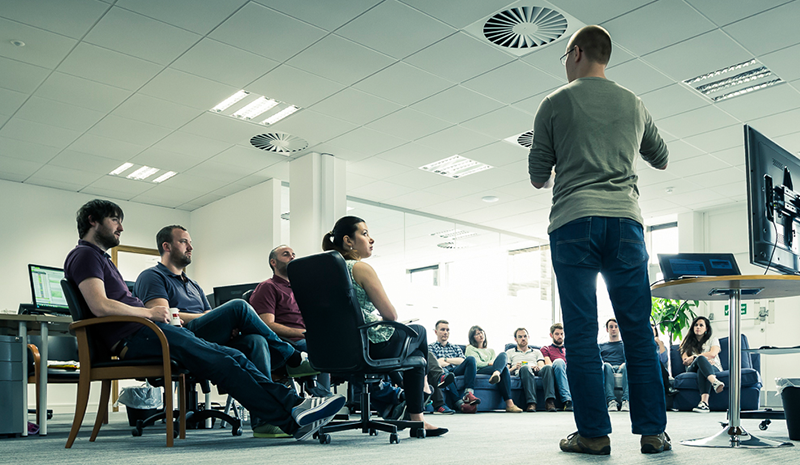By Sean Markey on 1 May 2015

On the 21st of April 2015, Google finally began to roll out its highly anticipated about Mobile Algorithm Update. Of course with the internet being the internet, the powers that be decided that "Google's Mobile Algorithm Update' wasn't a hyperbolic enough name so christened this latest reworking of how Google search engine results operate the 'Mobilegeddon'.
What is Mobilegeddon?
To make a long story short, Mobilegeddon is what most people call the mobile specific algorithm update which was launched by Google on April 21st, 2015. The reasoning behind this update was to ensure that Google search queries made on mobile phones would deliver results consisting of websites which were fully optimised to be viewed on mobile devices, resulting in a much better user experience for people making Google searches via their mobile phones.
In principal, web pages which were not deemed 'mobile friendly' according to Google's new algorithm would be 'punished' in terms of loss of ranking in search results. It is also worth noting that Mobilegeddon judges individual pages as opposed to full websites. Some websites may have for example, landing pages which were not properly optimised for mobile devices which were penalised as well as blog pages which were optimised and received no penalties.
Does Mobilegeddon Affect Desktop and Tablet Search Results?
In short, no. The algorithm update known as Mobilegeddon only affects searches made on mobile phones. To that end, searches made on tablets (eg: iPads), desktop and laptop computers are completely unaffected by the Mobilegeddon update.
Does Mobilegeddon Affect PPC Ads or Local Search Results?
No. Search results affected by Mobilegeddon are limited to what are known as the 'Blue 10' search results, the ten 'normal' looking results that Google displays per SERP (Search Engine Results Page). Google ads (including Cost Per Click Adverts) as well as the Local Listings, which appear in some SERPS separate to the Blue 10, are not affected by Mobilegeddon and do not currently (it is always good practice to add a caveat in these matters as Google can and have been known to change how their algorithms work with little or no notice) need to be fully optimised for mobile searches in order to appease the new algorithm.
How Big is Mobilegeddon?
While the media certainly made a big fuss about Mobilegeddon, now that it has been around for a while, the results were somewhat less apocalyptic than many internet doom-merchants gleefully predicted (the sound of them cracking their knuckles in order to pen articles with names along the lines of "SEO Is Dead... Again" and "Mobilegeddon is Killing Your Conversions - Give Us Money to Fix Them"). Honestly though, the advent of Mobilegeddon has been somewhat underwhelming considering all the talk that came beforehand.
Google's own Zineb Ait Bahajji claimed that Google's Mobile Algorithm Update (which did not receive a cute animal name for reasons which cannot yet be determined) would be "bigger than Panda or Google". In context, Google's Panda and Penguin algorithm updates affected approximately 12 and 4% of search results respectively. An opinion poll conducted by Search Engine Roundtable showed that 70% of webmasters had not noticed any real changes a full week after Google's Mobile Algorithm Update was rolled out.
Google maintains that the roll out of 'Mobilegeddon' saw an uptick in mobile friendly websites of nearly 5% as webmasters scrambled to ensure that their web pages were up to scratch and avoid the dreaded penalty. However, Google have also stated that:
The intent of the search query is still a very strong signal -- so even if a page with high quality content is not mobile-friendly, it could still rank high if it has great content for the query."
Did Anyone Get Hit by Mobilegeddon Penalties?
While most webmasters didn't notice any drastic changes to their SERPs in the wake of Mobilegeddon, quite a few big hitters did find themselves falling foul of the mobile algorithm update. These included:
- NBC Sports
- Vogue
- SongLyrics.com
- Bloomberg
How do you Check if your Site is Optimised for Mobile Searches on Google?
Thankfully, Google have made it very easy for webmasters to check if their web pages are fully optimised for Google mobile searches. They have added a simple tool to their Webmaster resources that allows you to simply paste the URL of the page you want to check and click Enter. Within seconds, Google will have fully judged the page in question and tell you whether or not it is what they consider to be mobile friendly. More useful still, should your page fail the 'mobile friendly' test, this new tool from Google will inform you of what changes need to be made to your page.
It is then up to you as a webmaster to see that these changes are made and then resubmit the page to Google. Once resubmitted, pages are generally 'restored' within 72 hours. Remember, as the Google Mobile Algorithm Update applies to individual pages as opposed to full websites, you will most likely have to make multiple submissions.
Best Ways to Optimise Against Mobilegeddon Penalties:
- Clear Headlines
- Easy to Click Buttons
- Keep Paragraphs Short
- Prominent Call to Action
- Brief Meta Description
- Rich Schema Tags
- Responsive Design
Mobile Site Vs Responsive Website Design:
Mobile Site Pros:
- Can be customised specifically for mobile users
- Generally the most mobile-friendly version of a site
- Easier and cheaper to design
Mobile Site Cons:
- Recurring maintenance
- Higher costs for updating the content of multiple websites
- May need to be reworked to work with future web browsers
Responsive Website Design Pros:
- Highly flexible – one responsive website works on all devices
- This is Google’s recommended configuration
- Generally a better return on investment since most responsive sites won’t need much future maintenance
Responsive Website Design Cons:
- More expensive upfront cost
- Does not convert to all mobiles as well as a specifically designed mobile site
We hope that our rundown of Google's Mobile Algorithm Update AKA Mobilegeddon has been helpful. If you have any more questions pertaining to Mobilegeddon or indeed any other search or social media topics feel free to send us a tweet.
- Sean Markey








